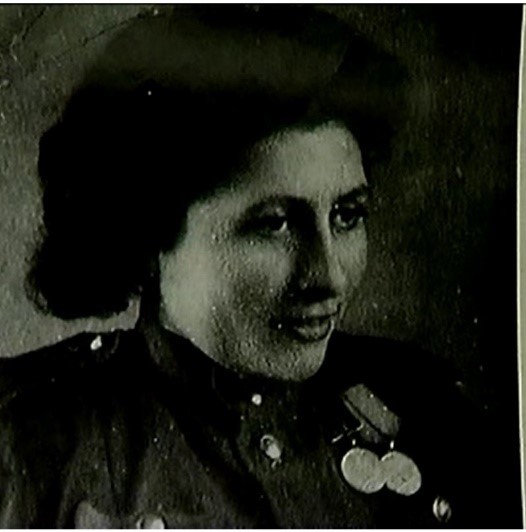Bella Rubashkina was born in 1922 in Rudnya, a small town in western Russia, on the Belorussian border, some ten miles north of Lyubavichi (Lubavitch). Her father Beniamin was a farmer, and he worked at a Jewish agricultural commune in the 1920s. In 1930, the Rubashkins moved to a more "urbanized" section of Rudnya, where Beniamin began to work at a procurement office for agricultural produce. He was popularly believed to be a distant relative of the Lubavitcher Chasidic dynasty, and was therefore accorded special respect by the Jewish community. Bella and her two siblings were non-observant; only her brother received some basic Judaic education.
Following the outbreak of the Soviet-German War in June 1941, Beniamin was drafted into the Red Army. The rest of the family failed to evacuate, and were incarcerated in the Rudnya Ghetto. Bella survived the first massacre of October 21, 1941, which claimed the lives of her mother and sister. In January-February 1942, the Soviet counteroffensive from Moscow approached the area; the 4th Shock Army of General Yeryomenko was closing in on Rudnya. The Nazis decided to liquidate the Rudnya Ghetto; the final mass murder was to take place on February 23, 1942. In anticipation of that, Bella managed to escape from Rudnya, but her brother failed to do so, and was captured and killed. Sympathetic local peasants helped Bella get to the frontline, and shortly thereafter she ran into some Soviet soldiers. She was adopted by this military unit as a medical instructor. Two months later, the unit commander sent her to study medicine in the Soviet rear; for the first time, she was issued a military uniform. Accompanied by a subaltern officer, Bella arrived at the Ilyino railway station, where she met two Jewish girls from the neighboring town of Gusino. The two were sisters, and they had likewise escaped from a mass shooting. After learning that these girls had a similar story, Bella decided to stay with them, instead of going away to study. The subaltern officer was furious with her for this insubordination, but Bella was adamant. Her military uniform saved her. Ilyino was the site of the HQ of the 4th Shock Army; thus, she took the two sisters and approached the chief of the Medical-Sanitary Department of the Shock Army. Upon hearing their stories, the officer said: "Yiddishe tekhter, vos tut men mit aikh?" [Yiddish for 'Jewish daughters, what is to be done with you?'] Luckily, the elder sister from Gusino had had two years of medical training, and this, coupled with Bella's uniform, decided their fate. The chief of the Medical Department sent them as nurses to the evacuation hospital in Staraya Toropa. According to Bella's recollections, most of the hospital staff was Jewish, and the new nurses were greeted warmly.1
The evacuation hospital received wounded soldiers directly from the battlefield, and, in many cases, they would be sent on into the rear. Bella's first job was giving first aid to the wounded and determining whether the patient ought to be transferred into the rear. Senior nurse Bella Rubashkina went on to serve with this hospital until the end of the war. The hospital traveled through western Russia, northern Belorussia, Lithuania, and East Prussia. Bella was discharged from the military in 1945 in Riga. After the war, she lived in Latvia – first in Ventspils, and then in Riga.
In the course of the war, Bella Rubashkina was awarded the Order of the Red Star, two medals "For Battle Merit", and other medals.
- 1. YVA O.93/34056







